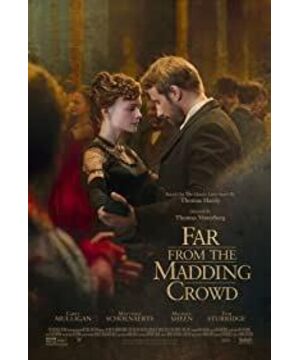She longs for independence, but I think what caused a bit of a detour is that women are passive in marriage customs, and their passions and desires cannot be released on their own initiative. Therefore, under the stimulation of a slutty man with such an outgoing desire, he mistakenly thought that he could find her. A person with the right taste.
The woman always exists as the one who is proposed, as a sexual object and as a marriage object. Then I think that the entanglement of the heroine's three emotional experiences originates from the fact that she not only intends to become an independent woman in life, but in essence, deep down in her subconscious, she longs for sexual initiative. But she didn't realize it under the traditional marriage proposal and the lady's request for women.
She wanted to seize the initiative, and losing the initiative made her unhappy, whether it was a naughty Valentine's Day card, being continuously urged to marry by Maxine, or unwilling to be offended by the shepherd. When she said that she didn't want to get married and didn't think she needed a husband, she was actually hinting in her heart that she didn't want everything to happen when she lost control.
When a sergeant in red appears in the countryside, red is a hint of the initiative of desire. The sergeant's initiative, frivolity and undisguised desire are actually a reflection of the heroine's heart. In the movie, the heroine has a passionate scene with the sergeant, and quickly completes the wedding (here the shooting emphasizes the rapidity and deliberately ignores the wedding), which is the release of the heroine's desire and the initiative of desire. There is a saying, why are good girls always attracted to bad boys? In fact, people can only be attracted by their true inner self. If they suppress the outward instinct of aggression and desire, they will release it through other channels.
The obvious contrast is the elegant gentleman Maxine. When he proposed for the second time, he said, even if you have no passion or desire for me, I will not care, but this should be the reason for the failure of the heroine to practice independence before. If the failure of the first marriage proposal was that Maxine ignored the heroine's pursuit of independence, then this second time has already made up for it very well. The respect of the heroine shows great respect and sincerity, but why is it still difficult for the heroine to make up her mind?
It may be caused by lack of desire. Maxine is really too controlling. Even in prison, he can quickly maintain a calm expression. He has no emotional expression and is overly suppressed, so he does not have any sexual tension that the heroine wants. It is difficult for him to realize the desire of the heroine to control desire. Maxine can do not care that the heroine has no passion and desire for him, but this is what the heroine cares about the most.
Honestly, if this is just a simple wiggly polyamorous love story, it would be odd for Maxine to add that sentence to her marriage proposal. So I think since there is such a paragraph, let the characters say the core reason for the different directions of these three relationships.
So I think, on the surface, what the heroine pursues, and what she has always declared in front of others, is independence and autonomy, but this is just a trick to the truth.
Because you see, what she's promoting, in front of the sergeant, seems like a complete mockery of the past. The sergeant declared himself the master, and rudely scolded the shepherd that he should report to himself when the shepherd reported to the mistress. And to splurge on gambling, through the glass, through the eyes of the heroine, we see him slashing at farm animals. Then we also clearly found that in the face of all this, the heroine did not have any more violent opposition at all, except for leaving in disappointment and silently commenting. Judging from the fact that the sergeant had to elope with the hostess' money, the essential economic power was still in the hands of the hostess at this time, but she didn't seem to have acted commensurately. This doesn't fit her claim to independence at all.
In the whole film, there are almost only two places where life choices are made very actively.
For the first time, the heroine told the shepherd why she would accept the sergeant's proposal, because the sergeant used a more beautiful and beloved woman to stimulate her, out of fear of losing the initiative, and hastily violated the values that he proclaimed everywhere .
The second time, after Maxine was imprisoned, the shepherd who had experienced ups and downs together said that he was going to leave, leaving the United Kingdom completely to go to the United States, and the heroine chased after him on horseback.
The heroine strongly held back, saying that he was not allowed to leave her, and repeatedly encouraged the shepherd to propose to her again, she said "ask me! ask me! ask me!", so you will know why the heroine ended up with the shepherd Being together, here is the time when the heroine can finally follow her heart, completely release the sexual tension, and fully grasp the initiative.
That is not for the shepherd to confess at all, but the heroine is personally proposing to the man in front of her. It is this woman who is proposing to this man.
From a passive, selected character, to the other party initiating the selection.
View more about Far from the Madding Crowd reviews











